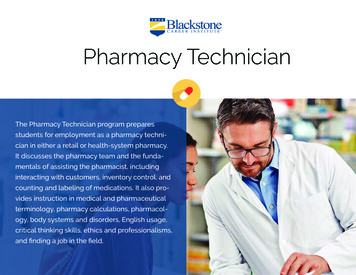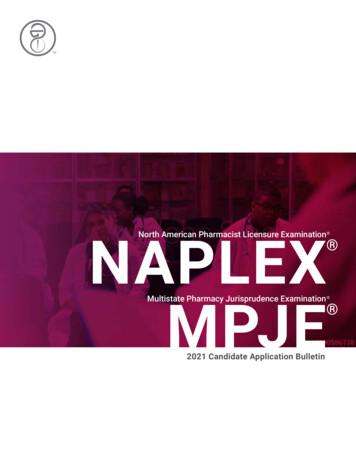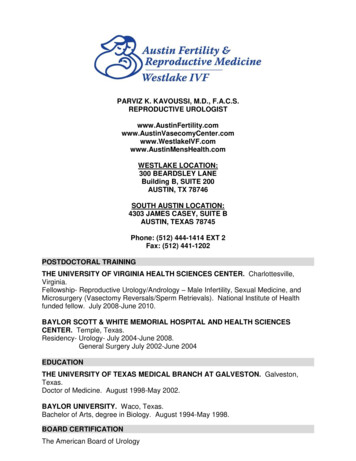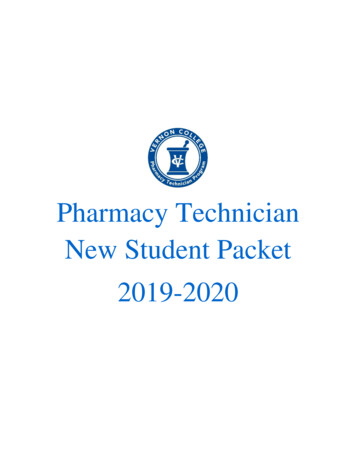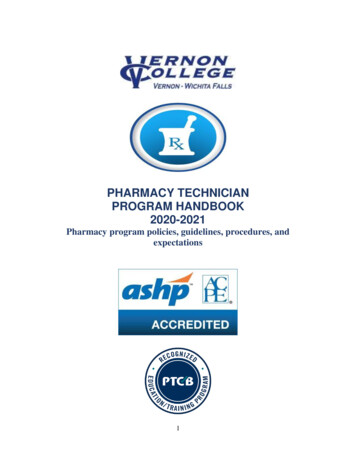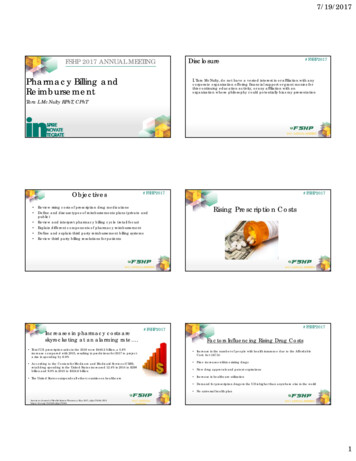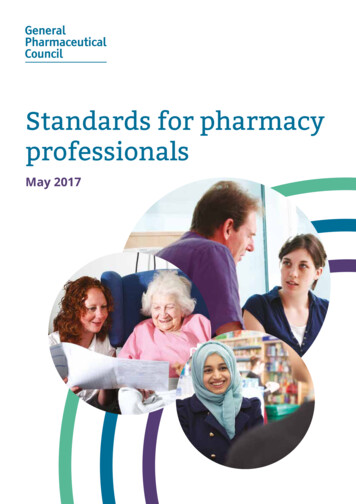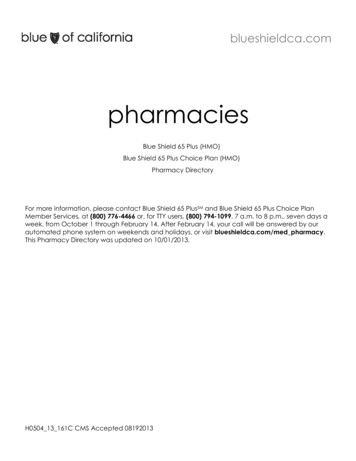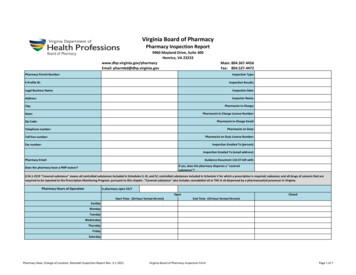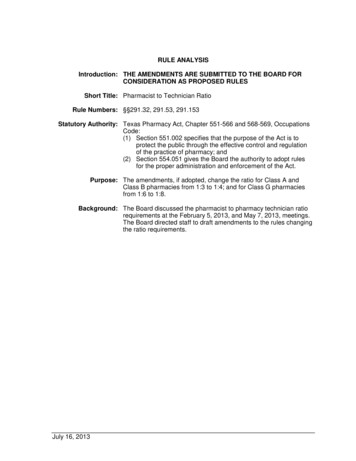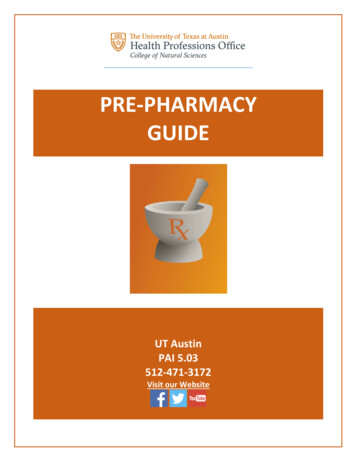
Transcription
PRE-PHARMACYGUIDEUT AustinPAI 5.03512-471-3172Visit our Website
Table of ContentsDoctor of Pharmacy . 3Selecting A Major . 3Pre-Pharmacy Self-Assessment . 4-10Pre-Pharmacy Prerequisites Time Line & Courses . 11Pharmacy School Application & Activities . 12Pharmacy Schools in Texas and Important Links 12-13Taking Courses Away from UT . 13Studying Abroad . 13-14Claiming AP/IB Credit . 14-15To Q or Not to Q . 16-17Academic Assistance . 18PCAT Information . 18-19Need a GPA Booster – Post Bacc Information . 19Research Schools Before You Apply . 20Time Line for Applying to Pharmacy School . 21Application Services . 22Letters of Reference . 22Personal Statement . 22Interview Tips/Preparation . 22-23Research Current Events in Pharmacy & Health Care . .23Financing Your Pharmacy Education . 24Summary of Health Professions Office Services . 25PrefaceThe information presented in this document provides important resources for UT Austin students planning onapplying to Pharmacy School.Additional Pre-Health Professions resources including prerequisites, time lines and application information forthe following Health Professions: Dentistry, Physician Assistant Studies, Pharmacy, Occupational Therapy,Physical Therapy, Optometry and Veterinary Medicine can be found on the Health Professions website:http://cns.utexas.edu/health-professions2
Doctor of Pharmacy (Pharm.D.)Pharmacy is a doctoral health profession in which licensed professionals provide information aboutmedications to patients and health care professionals. As "medication experts," pharmacists are concernedwith safeguarding the public's health in matters relating to medication distribution and use and disease statemanagement.Pharmacists play a vital role in improving patient care through the medicine and information they provide.Pharmacists dispense medications prescribed by physicians and other health practitioners and monitor patienthealth. They advise physicians and other health practitioners on the selection, dosages, interactions, and sideeffects of medications.Individuals who hold a Pharm.D., can also be pharmaceutical scientists, who are expertly trained to discover,develop, test and manufacture new medications. Typical pharmaceutical scientists spend most of their time ina laboratory discovering and learning how different compounds interact with disease-causing cells andorganisms. In addition, they investigate how these compounds interact with the human body to ultimatelydetermine if they can become new drugs.For more information on pursuing a degree in pharmacy, see the American Association of Colleges ofPharmacy website.Additional information: ySelecting a MajorFor many pharmacy school programs, a bachelor’s degree is not required; these schools only require thecompletion of the pre-pharmacy pre-requisites to apply. However, some schools may require a bachelor’sdegree so check with the schools you wish to apply to beforehand.If your pharmacy schools require a bachelor’s degree or if you want to complete one before applying topharmacy school, what should you major in at UT? A common myth is that you have to major in a sciencedegree as a pre-pharmacy student. We recommend that you choose a degree based on your interests. It isimportant to choose a major based on your academic interests rather than one that you think looks good topharmacy schools. Choose a major that you are passionate about, whether it is a major in liberal arts,business, public health, or something else entirely. Completing the prerequisites for pharmacy school can beaccomplished regardless of your major.Pharmacy schools accept students who show broad interests in their academic coursework through a nonscience major. Choose a major that may serve as an alternate career path in case you change your mind aboutpharmacy school.Explore majors/health professions further at one or more of the following resources: My Next Move https://www.mynextmove.org/ Occupational Outlook Handbook http://www.bls.gov/ooh/healthcare/home.htm Explore Health Careers: http://explorehealthcareers.org/en/home3
Pre-Pharmacy Self-AssessmentThe assessment below is designed to assess pharmacy school application strengths. If you are a newPre-Pharmacy student use this assessment as a planning guide for your Pre-Pharmacy Pathway.(Please check out the New-Pre Health Students page under Current Student on the Health Professionswebsite: http://cns.utexas.edu/health-professions).Are you working towards submitting a well-rounded application?Start by Developing Your Personal QualitiesIndividuals who are successful in their pursuit of a health care career possess qualities that they develop asyoung adults. These include: Good Judgment, Self-Discipline, Leadership/Accountability, Reliability,Motivation/Persistence, Honesty, Maturity, Compassion/Empathy, Integrity, Intellectual Curiosity, StrongWork Ethic, and Cultural Competency. Develop these qualities through the experiences and activities youchoose to get involved with.I want to develop my following qualities:How am I going to develop these qualities (be specific)?Here are some ideas to get you started:Get Involved & Gain ExperienceThere are several ways you can get involved. Get involved in what you are interested in. This is key! Thereare many things you can do to build your application that include but are not limited to: volunteering,shadowing, studying abroad, and/or participating in a summer program. Get involved on campus, tutor, andmentor, teach, and participate in Rec Sports. The list goes on and on. If you are considering adding studyabroad to your list, check out the study abroad section in this guide. Always remember to be yourself and dowhat you enjoy.VolunteeringExperience giving back to the community will be looked upon favorably by professional school admissionscommittees. If some of your volunteering is in a pharmacy or other health care setting, you can combinevolunteering with exposure to the field. A community service activity in which you are directly helping peopleface-to-face is of the most value, and making an ongoing commitment to that community service gives youtime to grow and gain real value from the experience.Volunteer ExperienceDates (can list timeHoursResponsibilitiesperiod or individualdates)4
What have I learned about myself through these experiences?Have I involved myself in a diverse set of experiences? What skills have I enhanced/gained through theseexperiences? (For example: I have become a better communicator through my volunteering experiences at thelocal hospital – explain how you have done this.)I want to explore the following volunteer activities:Quick Tip:Volunteering is required for some pharmacy schools. It is a good idea to balance your volunteering andmake sure to have some of your volunteering in a health care setting. Track your volunteer hours, as mostprofessional school applications will ask for details of the time you spent volunteering. Keep a record of yourvolunteer supervisor(s), including name(s) and title(s).ShadowingShadowing means working directly with a health care provider in their professional environment. You have theopportunity to observe how they plan their day, how they interact with their patients, how they chose theircareer, and how they feel about current events!Pharmacist Name or Name ofExperienceSpecialtyHoursType of Experience:Shadow/Volunteer/PaidWhat have I learned from these experiences?I want to reach out to the following pharmacists to inquire about shadowing:5
Quick TipFinding a health care provider who is willing to allow you to shadow can be a challenge, but it is worth theeffort. Many students start with their own health care providers. You may also network with other prehealth students to see where they have shadowed. Check out HPO’s Shadowing ResourcesDirect Patient Care Experience – Getting Your Pharmacy Technician Certificate!It can be good to gain some hands-on experience to add to your application. Obtaining yourpharmacy technician certification can help you in many ways. It can help you to get a job in thepharmacy field and gain valuable experience. It can also open doors for shadowing opportunities andis a good option to explore if you are considering applying to pharmacy school.Steps to getting your Pharmacy Technician Certification:1) Prepare for and take the Pharmacy Technician Certification Exam (PTCE) The Pharmacy Technician Certification Board (PTCB) has a national certification program thatenables pharmacy technicians to work more effectively with pharmacists to offer safe andeffective patient care and service. PTCB administers a nationally accredited certificationexamination for pharmacy technicians which tests knowledge in all practice settings.2) Apply for Pharmacy Technician Certification through PTCB.3) Apply to become a Registered Pharmacy Technician in the state of Texas. Application for Texas State Pharmacy Technician Registration Application. Complete this if youare certified by Pharmacy Technician Certification Board (PTCB).LeadershipLeadership, which can be developed in many different ways, needs to be demonstrated. Think abouthow you are developing leadership qualities and skills. Here are some ideas to get you started: Tutoring Mentoring Teaching / TA a course Get involved in student organizational leadershipName of r, President,Member, ed in with thistime (ex. 2organization/groupyears, 3semesters, etc.)6
What is the most important thing I have learned about myself from these experiences?Brainstorm some specific ways I can develop my leadership skills:Student Organization InvolvementExtracurricular activities help you become a well-rounded student because you develop not onlyknowledge and thinking skills but also social skills, group work, empathy, team building,organizational and motivational skills.I am a part of the following student orgs:I want to join the following student orgs:Quick Tip:There are over 1000 registered student organizations on campus. There are close to 30 health-relatedorganizations. Check the Office of the Dean of Students HornsLink tions) for a searchable database of student orgs.AcademicsAcademics include your overall and science GPA’s and PCAT Scores. How well are you doing? Are youtaking between 14-17 credit hours per semester? Are you keeping your grades up? Use the GPAcalculator in your UT Direct account to figure out your GPA.Overall GPA**This includes all course taken at UT and other institutions7
Science GPAQuick TipTo be competitive for pharmacy school, you will need average overall and science GPA’s of at least 3.5 orabove, depending on the schools you plan on applying to. This means you need to be making A’s and B’swith more A’s than B’s. If you are behind in your classes, don’t wait until you get your first poor test scoreto ask for help. Check out Sanger Learning Center for more information on academic assistance.My PCAT Scale Score/Percentile Rank:Writing/Mean / Verbal Ability / Biology / Chemistry /Reading Comprehension / Quantitative Ability / Composite /Quick TipOn the current PCAT, the average of matriculated students have a Composite Percentile Rank of 50-70%.While you should aim for a 70-80%, each school may have different averages. Please see the PSAR websitefor more information on each Pharmacy school’s requirements. Please see a Pre-Health Professions Coach ifyou have further PCAT questions, and check out the PCAT system portion of this guide.Get in the Habit of Personal ReflectionYour insights about who you are as a person and how your experiences have shaped you will be of tremendousbenefit when it is time to write your personal statement (a required part of your professional schoolapplication). Keep a journal handy so you can jot down your thoughts and observations!Track Your ProgressWhat characteristics do I have that I feel will help me be an excellent pharmacist?Have I had experience working with people from backgrounds different from my own? What impacthas it had on me?Why do I want to be a pharmacist?Can you go beyond loving science and wanting to help? Remember there are many helping professions outthere? Why this one?8
EvaluationMark Yes or No for each question. This will allow you to identify areas in which you feel strongest and areas inwhich you wish to grow.Can you explain to someone why you want to be a pharmacist?YNIs your GPA above a 3.5?YNHave your grades improved over time?YNHave you shadowed more than one type of pharmacist?YN9
Does your application reflect a diverse set of extracurricular activities Yover time?NHave you shown consistency with your volunteeractivities/community service?NYGet to Know Your FacultyThis can be challenging at UT Austin—the campus is huge and most of the classes in your first year have largenumbers of participants. Even though the professors can sometimes seem tough or intimidating, most of themare very approachable one-on-one. Visit your professors during office hours, even if you are doing well intheir class. It will make your request for a future letter of evaluation much easier.Who are your letter writers?I would like to ask the following faculty for letters of evaluation:1)2)3)I would like to ask the following fourth individual for a letter of evaluation; this letter will add adifferent dimension to my application:1)***Once you have completed this self-assessment, if you have not spoken with a Pre-Health Professions coacheither through attending drop in’s or during an appointment, we recommend that you do so in order to discussthese topics as well as your application strengths as a whole. Make sure to track your progress!Notes:10
Pre-Pharmacy Prerequisites TimelineThis time line is an example of how UT Austin students may complete the pre-pharmacy course requirementsfor the Texas pharmacy schools.Some Texas schools and many out-of-state pharmacy schools require the courses listed in Year 3; however,these courses are highly recommended to be well-prepared for any PharmD program.SEE COURSE DETAILS, FOOTNOTES, and UPDATES on the PREREQUISITE COURSES pdf on the PRE-PHARMACYPATHWAY PAGE under PREREQUISITES, TIME LINE & STATISTICSIn addition to the courses below, complete the UT Austin Core Curriculum and plus any additional GeneralEducation and Science courses required by individual schools. See specific schools for details.FIRST YEARFallCalculusChemistry IBiology ISpringStatisticsChemistry IIChemistry LabBiology IISECOND YEARFallOrganic Chemistry IGeneticsBiology LabProfessional Comm. SkillsSpringOrganic Chemistry IIOrganic Chemistry LabMicrobiologyMicrobiology LabTHIRD YEARFallAnatomySpringPhysiologyPhysiology LabSummerPhysics IPhysics I LabSummerPCAT preparationTake PCAT July or Sept.Apply in July or AugustSummerContinue pharmacyexperience andactivities to becomewell-prepared forpharmacy schoolNOTE:Most students require a minimum of 3 years to complete requirements.Many students complete a bachelor’s degree and apply in the summer or early fall before Year 4 to startpharmacy school in Year 5.11
First & Second Year Pre-Pharmacy ActivitiesFirst and Second YearsÊ Subscribe to HPOinfo e-mails hereÊ Take an average to heavy course load: 14-16 hours is considered a normal pre-pharmacy course load.It is okay to take 12-13 hours your first semester at UT Austin.Ê Get to know your professors. You will need faculty evaluations when you apply to pharmacy schools.Two from science faculty are recommended.Ê Meet with a pre-health professions coach in the Health Professions Office to explore healthprofessions and to discuss your goals and preparation, especially how to make the most out of yourfirst two years.Ê Declare a major by your second year on campus. Work with your academic advisor.Ê Get involved in extracurricular activities (e.g., student organizations, volunteering, and shadowing inmedical settings, community service).Ê Attend the Health Professions Fair each year, generally held in February or March, to visit withrepresentatives from pharmacy schools and other health professions programs.Ê Keep viable career alternatives open.Ê Visit pharmacy school web sites; decide where you will appPharmacy Schools & Important LinksGeneral information on the profession and a list of accredited programs in the United States are available at:American Association of Colleges of PharmacyThere are seven fully accredited schools in Texas where one can earn a Pharm. D. degree.Texas Pharmacy Schools (Public)Texas A&M Rangel College of Pharmacy (Kingsville and College Station)Texas Southern University College of Pharmacy & Health Sciences (Houston)Texas Tech University HSC School of Pharmacy (Amarillo and Abilene)University of Houston College of Pharmacy (Houston)University of North Texas System, College of Pharmacy (Fort Worth)University of Texas at Austin College of Pharmacy (Austin)Texas Pharmacy Schools (Private)University of the Incarnate Word, Feik School of Pharmacy (San Antonio)There are two new PharmD schools in Texas that are working toward accreditation status.New Texas Pharmacy Schools (Public) – (See school sites for information on their current status.)University of Texas at El Paso, School of Pharmacy (El Paso) – Pre-Candidate StatusUniversity of Texas at Tyler, Fisch College of Pharmacy (Tyler) - Candidate StatusImportant Links and Information:See our Pre-Pharmacy pathway web page to learn more about preparing for and applying to Pharmacyschools.Most Texas and out-of-state pharmacy programs use the Pharmacy College Application Service (PharmCAS)which usually opens during the summer. Students apply during the late summer and early fall, one yearprior to starting pharmacy school. Application deadlines vary from school to school.12
Useful links: Pharmacy Career Information PharmCAS Pharmacy College Admission Test (PCAT) UT College of Pharmacy Admission Statistics Information for Foreign Students and GraduatesPharmacy School Prerequisite CoursesFor the most updated and current Pharmacy school and prerequisite courses, please visit the Pre-PharmacyPathways page here. Completion of the courses listed on this site will prepare you for Texas and most out-ofstate United States Pharmacy schools. If you need to find out the pre-requisites for an out of state school youcan consult the PSAR admission requirements guide and/or also contact that particular schools admissionsoffice and check out the PharmCAS School Directory.Can I take Courses Away From UT?Studying Abroad?Most health professions schools require that prerequisites be taken at U.S. accredited schools, and some willaccept credits from Canadian accredited schools.Although exchange program courses and some affiliated program courses are counted as in-residence creditby UT Austin, according to Texas state law, foreign course work cannot be counted in the GPAs for applicationto graduate and post-baccalaureate professional schools. The rules and policies can vary among the13
professional schools. Students who plan to study abroad should research this carefully for the schools andapplication services they plan to apply to. Look in the education requirements, transcripts, and FAQ sections oftheir web sites for information about foreign course work and study abroad. [See example on next page.]UT Austin faculty-led courses are “in-residence” courses as well as U.S. credits, and so courses likeOrganic Chemistry II (CH 320N) taught in Spain by UT Austin faculty can be used to satisfy a prerequisite;however, for many students taking these rigorous courses in only 5 weeks may not be recommended. It isimportant that pre-health professions students master these courses and retain this knowledge for success inentrance exams and in advanced studies.The UT Austin Health Professions Office very strongly recommends that our students satisfy their healthprofessions prerequisites at UT Austin. Use the study abroad opportunity to study the culture and language ofthat country and to satisfy general education requirements if approved by your academic advisor. Sciencecourses that are not considered direct preparation for the health professions can be considered as well.(Examples: research, ecology, environmental science; but NOT cell, molecular, micro, anatomy, physiologywhich figure heavily into your preparation and readiness for professional school and the admissionscommittee’s assessment of your application).STUDY ABROADIf you participated in a “Study (Education) Abroad” program under the auspices of a US institution and theinternational course work appears on the U.S. transcript as regular itemized credit, only list the US institutionon your PharmCAS application. Do NOT list the international (foreign) institution. Arrange for only the UStranscript to be sent to PharmCAS. PharmCAS will process study-abroad course work in the same manner asUS coursework.OVERSEAS US INSTITUTIONSPharmCAS recognizes “overseas US institutions” that are:1. Located outside US borders,2. Accredited by a regional institutional accrediting agency recognized by the US Department ofEducation, and3. Use English as the primary language of instruction and documentation.If you attended an overseas US institution listed below, report it to PharmCAS in the same manner as your USinstitutions by sending an official transcript to PharmCAS and listing all coursework on your PharmCASapplication. US institutions with campuses overseas (such as the University of Maryland at Munich) are alsoconsidered US colleges for which transcripts are required and all course work must be listed. Please note thatthis list of overseas institutions is not all-inclusive. Contact PharmCAS if you have questions.For full content on the PharmCAS web site t-youll-need-to-apply/transcripts/What about Claiming AP/IB Credit for Prerequisites?While we generally recommend that as a pre-health professions student you not “claim” AP/IB credit forprerequisite courses such as biology, chemistry, English, physics, and mathematics, these are importantdecisions that you must make and that require your careful consideration.It may seem like a convenient way to eliminate hours from your degree plan and accelerate your path toprofessional school, but claiming credit can actually be detrimental to your preparation for success onentrance exams and in professional studies. Advanced Placement and International Baccalaureate coursesvary in rigor, and they are generally not equivalent to the rigor of UT Austin courses. However, your AP/IBcourses can be very good preparation for taking these courses at UT Austin, providing the opportunity to14
master that material, become better prepared, enhance your GPA, and demonstrate your academic ability andreadiness for advanced study in health professions schools.Unless you are academically very well prepared, it is best to start with the introductory courses. Please consultwith your academic advisor for help in determining your readiness for higher level science courses. Mostschools that accept AP/IB credit will expect you to take additional upper-division course work in that area ofstudy.Science CoursesBiology and ChemistryIf you claim credit in courses like BIO 311D and BIO 311C you may not be adequately prepared for the rigorousnext course here at UT Austin, BIO 325 (Genetics). If you claim credit for CH 301 and CH 302, your first collegelevel chemistry course at UT Austin will be CH 310M (Organic Chemistry I).Honors students in biology and chemistry may claim test credit, register in the honors sequence for biology orchemistry, and will take additional upper-division credits in those areas, making up for the lack of first-yearhours in those disciplines.Your UT Austin faculty will expect you to be prepared to learn and understand the material conceptually andtheoretically in order to understand test questions well enough to earn A's on your exams. They will teachmaterial beyond the textbook that was not presented in your high school courses. You will be in second yearcourses with many students who took General Biology and General Chemistry here and are well prepared tohandle the exams in the more advanced courses. They will set the standard for the grade scale or curve in yourclasses.PhysicsPhysics is required to prepare for some health professions schools. In some cases, you will be tested onphysics in your professional school entrance exam. We strongly recommend taking physics at the college levelif you are preparing for a professional school that requires physics.Calculus and StatisticsFor the Texas medical schools, if you take statistics in the classroom here at UT Austin, you can use statistics tosatisfy the math prerequisite. Then if your degree plan or any of your science courses require calculus, youcan decide with your academic advisor whether to use credit-by-exam or take the course(s) in the classroom.For all health professions schools, both in Texas and out-of-state, it is important to check their admissions websites for any restrictions and preferences on credit-by-exam.Non-Science CoursesIt is usually acceptable to claim credit-by-exam for general education or core curriculum requirements such ashistory and government. Claiming this type of credit may give you time to take the courses that will prepareyou for professional school and school entrance exams. On the other hand, critical thinking skills and anunderstanding of ethics, society, community, cultures, history, and human behavior are important for yoursuccess now and throughout your professional and personal life. Taking college level courses is a good way todevelop these areas of knowledge.15
English Literature, Rhetoric, WritingIf you claim credit for freshman writing and literature courses, we recommend taking additional courses in theclassroom at the college level. Even if your high school verbal skills were strong, this type of academic skillweakens over time if you do not use it.Verbal skills are extremely important to your success in your undergraduate course work, your entranceexams, in professional school, and as a health care professional. You must be able to read efficiently, at agood rate, with high comprehension and critical thinking skills. You must develop and maintain a goodvocabulary, not just for the sciences but also for social and behavioral sciences, ethics, policies andregulations, and procedural information. Many admissions deans recommend reading well-written novels inaddition to your textbook material.ADDITIONAL COMMENTSAlthough most pharmacy schools accept AP credit for admission, some schools do not.Review the information on our prerequisite courses lists and check individual school admissions websites orcontact their admissions offices to be sure about each school’s expectations. Taking courses in the collegeclassroom will help you to compete for admission and to succeed in professional school. We stronglyrecommend that you use these courses as building blocks that will be the foundation for your future career.To Q or Not to Q (or to switch to pass/fail)No admissions committee for any health professional school likes to see “Q drops” on a transcript. This is anindication that something became too much for you to handle and that you chose to drop the course ratherthan see it through. There are times
The Pharmacy Technician Certification Board (PTCB) has a national certification program that enables pharmacy technicians to work more effectively with pharmacists to offer safe and effective patient care and service. PTCB administers a nationally accredited certification examination for pharm
